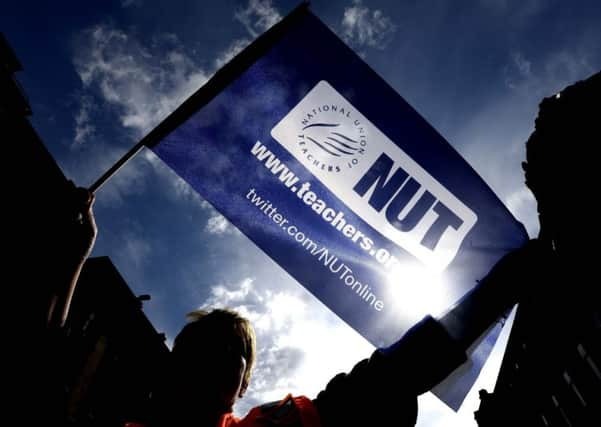Teachers could hold strike ballot over ‘schools funding crisis’


Members of the National Union of Teachers (NUT) could be asked to vote over national walkouts, at their annual conference in Yorkshire amid a growing row over tightening school budgets.
As well as dealing with real-terms cuts since 2010, from this September schools will also have to find more money for increases in pensions and National Insurance costs, as well as coping with continuing rises in pupil numbers, the union said.
Advertisement
Hide AdAdvertisement
Hide AdThe NUT is due to debate a priority motion at its conference in Harrogate this weekend which condemns the coalition Government’s education spending priorities and issues a call ahead of the General Election for political parties to commit to protecting funding in the future.
NUT deputy general secretary Kevin Courtney said education will face a “terrible set of cuts” if action is not taken.
The resolution, which is likely to be debated on Sunday, says that basic funding for schools - the direct school grant - has been frozen for the last five years, which represents “a significant cut in base funding” that has only been partly offset by the pupil premium - funding for poorer children.
It says: “Despite a growing shortage of school places, particularly in the primary phase, and a looming teacher recruitment and retention crisis, the coalition Government has prioritised funding for its ideologically-driven academies and free schools programme.”
Advertisement
Hide AdAdvertisement
Hide AdFigures show that least £241 million has been spent on 42 free schools in areas with no need for extra places forecast, the NUT claimed.
Mr Courtney said schools will need to find an extra 2.3 per cent for teachers’ pension scheme contributions alone from this September.
“There are some wrong priorities, we believe, in the way money has been spent,” he said.
He added: “We can’t see that it’s anything other than wasteful priorities to put money into schools where they are not needed.”
Advertisement
Hide AdAdvertisement
Hide AdThe resolution goes on to raise concerns about the Conservative Party’s election plans for education funding, and called other political parties, including Labour, to give assurances that they will protect funding per pupil in real terms to ensure that cuts are avoided after rises in pupil numbers are taken into account.
The Conservatives have said they will protect cash school spending per pupil, while Labour has committed to protecting the education budget for three to 19-year-olds in line with inflation.
Part of the NUT’s motion calls on the union’s executive to approach all the major political parties to get them to commit to protecting education spending in real terms, including restoring teachers’ pay to previous levels and encouraging members to take action at school and college level, alongside other unions, to defend teachers from “the impact of cuts on pay and working conditions”.
It also says that the executive should “prepare and ballot for a national campaign of strike and non-strike action, seeking the involvement of other teaching unions and non-teaching unions were appropriate, on the impact of cuts on pay and working conditions if no progress is made in talks with the new government on the issue of funding which would help avoid such cuts.”
Advertisement
Hide AdAdvertisement
Hide AdMr Courtney said: “It would be a terrible set of cuts that will happen if these things are not changed.”
The earliest the union is likely to ballot members would be in the summer term, after a new government has taken power, which opens the door to the prospect of industrial action taking place in the autumn term.
The union’s resolution comes just weeks after the Association of School and College Leaders (ASCL) said schools and colleges are being forced to cut courses and increase class sizes as a result of a growing funding ‘’crisis’’.
An analysis by the Institute for Fiscal Studies published last month suggested that schools could face a squeeze on spending, with cuts of up to 12% over the next parliament.
There are likely to be ‘’significant cost pressures’’ in the future as schools deal with increasing pupil numbers, rising costs and a growth in public sector earnings, it said.